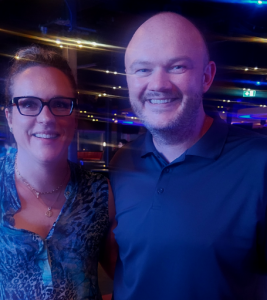Last night, I was fortunate enough to join an outstanding group of professionals advocating on behalf of Healthcare in Ontario, including in the MVA industry, at Premier Doug Ford’s Leaders Party.
Walking in, the staff were friendly, people were happy and it was a welcoming atmosphere. I joined this group of people who all are passionate about helping their clients and ensuring fair treatment for them as well as the healthcare community.

Thanking Doug Ford for his inclusion of AB in the 2024 Budget.
After his speech, the Premier and his team graciously spent time mixing with the guests.
I had the opportunity to personally thank Doug Ford for including the review of the Professional Service Guideline and Attendant Care Form 1 rates in the 2024 Budget.
Doug took the time to listen, was kind and polite, saying “thank you for what you do”.
Over time, our group and hopefully others will show consistency, be informative, be remembered, and help to impact positive change for Ontarians.
We also met Doug Ford’s Chief of Staff, Patrick Sackville. What a nice person. I had a great conversation with him, again thanking him for the inclusion of Accident Benefits in the Budget.
Patrick told me to keep up with advocacy. He said that a lot of people get to the early stages of being effective and then fall off. He said to keep bringing it up, reminding them, and being involved.
Overall, it was a great event. I’m thankful for the contributions of my colleagues who got us this far. I’m thankful for the opportunity to attend this event with this great group of advocates who are willing to put themselves out there and “do”. I am also very thankful to the Premier and his team for taking this massive step in a very positive direction.

Discussing AB with Patrick Sackville, Chief of Staff.
What I have learned about Advocacy
Over the past year, I have learned a significant amount about advocacy. I have connected with like-minded people, listened with an open mind, have been willing to admit to myself about previous bad tactics and make positive change. I feel that the mistakes I was making are common and I’d like to share my thoughts on improving the effectiveness of advocacy in general.
Here is a list of the top 8 strategies that I have learned over the past year to improve my advocacy. I hope that these are helpful to someone.
1. Being positive will get you much further than taking an aggressive stance.
People in positions of power are just normal people, too. They may have become politicians or gained their status because they want to help other people.
Naturally, people avoid others who are heckling them or showing them in a bad light. Online, they will likely disconnect or block negative advocators. They surely won’t engage.
Influential people will want to help and be connected with people who are positive and supportive. Online, they want their positive initiatives to be “liked” and shared. They will be more inviting and inclusive of people who are positive. They may not engage but, over time, they will notice those who consistently support them.
Instead of writing “The government never does anything to help”, make room for a hero and consider “We know you care about people – please consider making these changes and here is why”. Politicians don’t know the intricate details of your cause. Over time, patiently and kindly try to educate them on how it would improve the lives of others.
2. Persistency and building relationship are important.
You think you’re busy? People holding influential positions are very busy with their day-to-day work, meetings, events and lives. They simply don’t have the time to respond to every single phone call or letter.
Being a persistent, polite squeaky wheel who isn’t deterred by a lack of response is essential in eventually getting a positive response.
Overtime, build relationships with the people you are trying to reach by writing polite and informative letters and connecting and liking and sharing their positive work on social media. Eventually, you may get a response and increased opportunity to share your views.
2. Seek out leaders and organizations that care about your cause.
If the organization or person whom you are attempting to advocate to has shown that they “don’t care” about your cause, seek out leaders and organizations that do. There is more than one way to skin a cat, so they say, and I am a firm believer in where there’s a will, there’s a way. There are always other people and groups that can help to impact your cause and help you move it forward. Look at the bigger picture.
Good, caring leaders may not initially care about your cause. Over time (this is becoming a theme), engage with them to show why your cause is important and how it impacts the people that they care about.
4. Give leaders the benefit of doubt and assume that they are kind and have good intentions.
This one is easier said than done. Sometimes we have it stuck in our minds that influential people don’t care because they’re making bigger money and have bigger influencers of their own. Its easy to say “What’s the point? He’s being funded by deeper pockets and doesn’t care about our cause” or “The government hasn’t done anything for this cause in 10 years. Why would they now?” (That sounds pretty defeatist to me.)
Imagine that this is simply not the case and that you’re making a major mistake by assuming that this influential person doesn’t care about your cause.
Until you know for a fact otherwise, give leaders the benefit of the doubt and try to build relationships with them.
5. Reach out and connect with others interested in the same causes.
There’s strength in numbers. You should be intentionally trying to engage with others to create discussions when advocating in order to carry your message on further and longer.
A great way to do this is to connect with other people that you are seeing advocate online. If you’re both advocates of the same cause (or at least interested), you certainly should be connected.
There couldn’t be an easier way to connect and start communicating with someone than by saying “I see that you’re advocating a lot online for (this cause) and I like and respect that.”
6. Build informal “mentorship” relationships with advocates who are smarter than you, are open to helping you, and whom you can learn from.
By reaching out to others whom I saw being effective, persistent, smart and positive advocates, I received invaluable information, knowledge and support in moving my chosen cause forward. I also made friends with people that I really like and respect.
True advocates are naturally people who are compelled to help and invest in others. There is no one better to reach out to when you need help than another advocate.
I have learned more about advocacy in this past year with an informal mentorship than I have in the past 10 years. I have more hope about making change than I have had in a long time. Its been energizing – something that always helps further advocacy efforts.
Always make sure to express gratitude to people who help you become better advocates. It really does mean a lot to them.
7. Lift other advocates up.
Advocacy is not about competing- its about making breakthroughs for your cause. Together we can make bigger impacts. Work on putting your natural competitive instincts aside and put your cause first.
Take any opportunity that you can to lift others up and support them. Other people will want to continue supporting your efforts if you are open-hearted and reciprocal about supporting theirs.
8. Be open minded – advocacy can lead to other unrelated opportunities.
Incorporating the above points and being a positive, uplifting, supportive and hard working advocate always pays off. Maybe not for this cause at this time, but it will open the doors to other opportunities, relationships and experiences.
I welcome anyone interested in advocating for Accident Benefits to reach out. We’re stronger together.